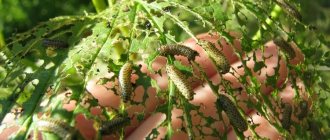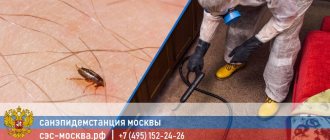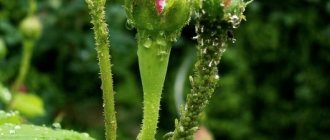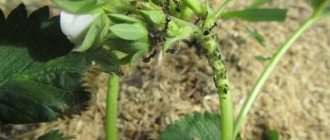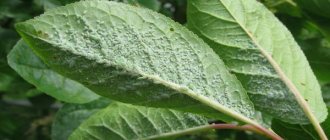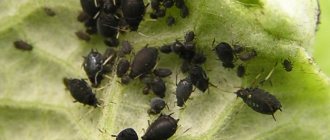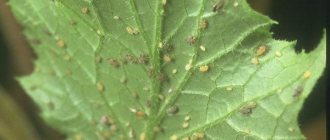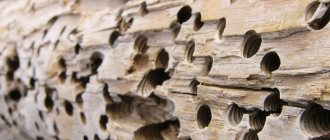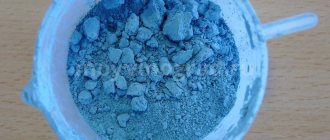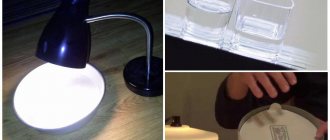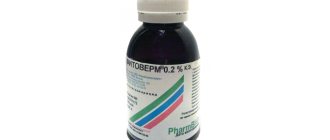Aphids are one of the fastest growing pests. Wingless female insects are capable of laying eggs even without fertilization by males. If the summer is hot, but there is no drought, then more than 10 generations may appear during the season.
Aphids suck the juice from young shoots of plants and spread dangerous viral diseases, so if measures are not taken in time to destroy the pests, there will be no harvest. Stores sell many drugs designed to kill aphids. However, most of them contain potent poisons that take more than a month to remove from the fruit. In addition, toxic substances kill not only harmful insects, but also beneficial ones, and when they get into the soil, even earthworms.
Therefore, many gardeners prefer to use a folk remedy that is safe for people and pets - vodka (ethyl alcohol, moonshine) to combat aphids.
Instructions for using vodka against aphids
Any vodka, alcohol or moonshine is suitable for spraying plants. You can use the “heads” of moonshine (the upper fraction), which still cannot be distilled again.
Treatment of garden plants should be carried out in the evening, at sunset, when insects become inactive. In bright sunlight, there is a high chance that plant leaves will get burned.
When spraying, you need to try to ensure that the liquid wets the leaves both above and below: pests often hide on the underside of the leaf blade. The water for preparing the solution should be warm (+25–27 °C).
Laundry or special green soap (sold in gardening stores) must be added to the spraying solution at the rate of 20 g of crushed soap per 1 liter of liquid. Soap shavings are first dissolved in a small amount of warm water and then mixed with the rest of the liquid.
Soap has a triple function:
- serves as an adhesive;
- compacts the leaves, making them “waxy”, which is why the pest cannot pierce them;
- clogs the breathing holes of aphids.
Ethanol in the fight against aphids
The fight against aphids can be considered as part of the care of garden and vegetable crops, since it must be carried out regularly and consists of complex treatments. These insects reproduce very quickly and can settle and reproduce on almost all plants. Aphids feed on the sap of leaves and stems and also spread viral and bacterial infections.
Stores offer many powerful insecticides that will help you quickly get rid of aphids. But you need to keep in mind that such substances can harm the ecosystem of your garden and destroy beneficial insects. Pesticides, which are contained in most drugs, fall into the ground, and then are absorbed by plants with moisture, accumulate and are deposited in the fruits.
To combat aphids, you can use alcohol, any type of vodka, or moonshine.
That is why gardeners are increasingly using traditional methods to combat parasites. The use of ethanol against aphids is widespread, since this element is absolutely safe for children and pets.
To treat plants, you can use not only alcohol, but also any vodka or moonshine. Even unsuitable for consumption pervak or “heads and tails” of moonshine, which are separated during the distillation of this product, are suitable.
Ethanol helps in the fight against aphids, as its vapors have a detrimental effect on the central nervous system of these insects. Their respiratory process is disrupted, and they lose the ability to stay on plant stems. Those individuals that have not fallen cannot continue to feed: the smell and bitter taste repel parasites.
Recipes for killing aphids with vodka
No. 1. Add 300 ml of vodka or 150 ml of alcohol and soap shavings to 1 liter of water. This solution is only suitable for treating trees and fruit bushes.
No. 2. To treat roses and other ornamental shrubs, vegetables and berries, mix 1 liter of water, 100 g of vodka and soap.
No. 3. Pour 1 liter of Coca-Cola into a container and leave for a day so that the gas evaporates. Then add 100 ml of vodka and soap to the drink. Coca-Cola contains acids that are toxic to aphids, and alcohol enhances the effect of these substances.
No. 4. Mix 1 liter of water, 300 ml of vegetable oil, 100 ml of vodka and soap. Vegetable oil forms a thin film that prevents aphids from breathing. It is advisable to use unrefined oil, since the smell of refined oil attracts mole crickets.
Treatment for aphids of currants and other fruit bushes
Most often, currants suffer from aphids. If the fruit bush is blooming, then for spraying you should prepare a solution according to recipes No. 2 or No. 3. For a bush with ovaries, the liquid according to recipe No. 1 is well suited.
It is advisable to cut off the tops of branches, especially those heavily affected by aphids, and burn them. If it’s a shame to cut off the branches, you can dip them one at a time into the solution for 3–5 seconds. The rest of the bush is thoroughly sprayed.
It must be remembered that aphids do not fall onto the branches themselves: they are brought by ants. To prevent ants from bringing pests again, millet is poured around the bushes.
Spraying trees
The recipe for treating trees against aphids with vodka is chosen according to the same principle as for shrubs: if the tree is blooming, then recipe No. 1 is not suitable.
After getting rid of aphids, you need to block the ants' access to the tree crown. To do this, special traps are glued to the trunk. Another option: the trunk is wrapped with a strip of old fabric 20–30 cm wide. Ordinary fly strips are glued onto it. Millet is poured around the tree.
Spraying vegetable and berry crops
Some plants are natural “alcoholics”. For example, the solution according to recipe No. 1 is suitable for spraying tomatoes. Alcohol destroys the causative agents of blackleg. And tomatoes sprayed with it ripen faster. German scientists have proven that if you inject 0.5 ml of vodka into a milky-waxy tomato with a medical syringe, the fruit will ripen several weeks earlier.
Cucumbers also tolerate spraying with solution No. 1 very well. More delicate strawberries or wild strawberries are treated with solution No. 2 or No. 3. It is dangerous to use solution No. 4 so as not to attract a mole cricket.
The remaining plants should first be tested for tolerance to ethyl alcohol. To do this, treat one bush or one shoot. If after 24 hours the plant looks healthy and there are no burns, the entire plantation is sprayed.
Treatment of roses and chrysanthemums with vodka against aphids
Roses are tender and capricious. For spraying most varieties, solutions No. 2 or No. 4 are used. But first it is better to test the effect of the liquid on one shoot. If burns appear on it within a day, the concentration of vodka should be halved (add 1 liter of water and 20 g of soap to the solution). Before spraying, the tops of the shoots are dipped into the solution.
Chrysanthemums affected by aphids are treated in the same way as roses.
How to properly process
Let me remind you that processing time is of great importance, it is best to do this in the early morning hours or at sunset. During this period, insects are not so active. Aphids settle on young shoots and hide on the inside of leaves. This is where all your attention should be directed when spraying.
I have already talked about the combined protection of roses from aphids. After treating the bush, the pests fall to the ground. To kill insects, place a layer of ash under the root and pour hot water over it.
Do not keep the working solution: it must be used immediately after preparation. In this case, efficiency increases. Treatment needs to be carried out regularly; you can alternate vodka recipes with other folk remedies.
Acceleration of maturation
A study of the effect of ethanol on the ripening of tomatoes was carried out back in 1934 by Soviet botanists S.V. Soldatenkov and M.G. Kubli. During the experiment, alcohol solution in various concentrations was injected into unripe fruits during their growth and the results were observed.
As a result, scientists were able to speed up the process by 8-16 days, and the processed tomatoes tasted no different from regular ones. Subsequently, M. G. Kubli continued his experiments and two years later even published a fundamental work on this topic, but the experiments did not receive practical application.
What kind of pest is it and why is it dangerous?
Aphids are insects up to 2-3 mm in size. Its body is colored yellow-green, grayish-green or light green. Insects have wings and can fly from bush to bush.
In the spring, only females emerge from the eggs; they are able to reproduce without fertilization. Males appear in the fall. They fertilize the females, who will then lay eggs.
There are many varieties of the pest. Black currants, as a rule, are affected by gooseberry, and white and red ones - by red gall, hairy currant, and gall leaf aphids. Insects drink the cell sap, as a result the foliage withers and the buds become deformed. The growth of the bushes slows down and they stop bearing fruit.
Currants become weak, begin to hurt, and are often affected by fungi. Aphids also transmit viral diseases. If insect pests are not controlled, the bushes may die.
Preventive measures
To prevent the spread of aphids on roses, the following preventive and protective measures should be taken:
- in the spring, before the buds appear, treat the roses with insecticides (given above in this article);
- carry out the same treatment in the fall, before frost;
- regularly remove dried and damaged shoots, flowers and leaves;
- inspect roses more often to detect pests in time;
- Water regularly and on time;
- fertilize according to the seasonal schedule to maintain plant immunity;
- regularly loosen the soil under the bushes, mulch and remove weeds;
- Pay the same attention to other crops in your garden because aphids can spread from them to your roses.
Also consider planting neighbors for roses - plants that repel aphids. This was discussed above. Such prevention will protect beautiful roses from unwanted guests.
Pepper infusion
It sounds quite strange, but herbal infusions can also be used against aphids. Hot pepper works well. You will need a kilogram of pods. Chop as finely as possible, add a bucket of water and boil for at least an hour. Remove from heat and leave for two days. Then we filter and bottle it with tight lids. To use it this way: pour half a glass of pepper infusion into a bucket of water, dissolve two tablespoons of laundry soap and spray the bushes. To treat trees, the dose of pepper and soap should be doubled. And yes, the infusion should only be stored in a cool place.
If there is little snow, there will be no harvest: December 16 is Ivan the Silent Day
The money tree pleases with lush flowering: my secret is in caring for the leaves
A Brazilian travels 36 km by bike every day to take his loved one home.
We use vinegar
If you notice aphids on cabbage, vinegar will help. We dilute a tablespoon of acid in a liter of water and apply it to the fork and the ground around it, since larvae can be found in warm soil.
The procedure must be repeated after a week, and if the weather turns bad and it rains, then the next day.
Reasons for appearance
One of the main reasons for the appearance of aphids is ants in the garden. Insects form a natural symbiosis of species. Ants feed on sweet honeydew, a waste product of parasites. They carefully protect aphid colonies and spread them from bush to bush.
Other reasons:
- A large number of weeds. They serve as a refuge for aphids, from where they move to currants.
- Incorrect care. It is necessary to promptly prune dry branches where aphids overwinter. In addition, careful inspection and treatment of shrubs before buds open is necessary.
- Aphid migration. It occurs when the colony becomes too large. Winged individuals appear and move to other bushes.
The life cycle of individuals is very short, in one colony 10-15 generations change per season. Favorable conditions for aphid reproduction are dry, sunny weather.
